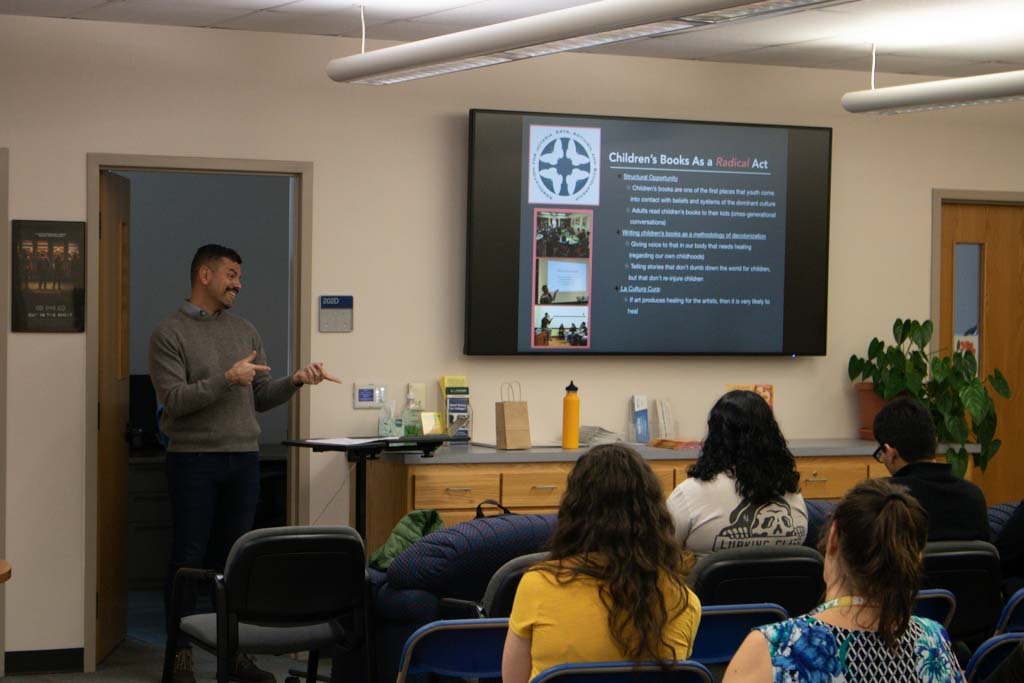Lane Community College was visited by the award-winning author and filmmaker Ernesto Javier Martínez on Feb. 6, who presented at the Gender Equity Center in Building 1. Martínez, an associate professor of ethnic studies at the University of Oregon, seeks to understand how marginalized communities in the United States use various forms of media that pertain to how the members see themselves through the lense of distorting violence that challenges their credibility as individuals.

Martínez wrote “When We Love Someone We Sing to Them,” an independently released book that won two international awards last October. His short film, “La Serenata” is influenced by the book, but reimagined for a more mature audience.
The film is about a young Mexican-American boy who learns about serenatas from his parents and how it is a treasured Mexican tradition. In it, the boy asks his parents for a song about a boy who loves a boy. His parents — surprised by the question — had to make the choice to reimagine their tradition in a way that will honor their son.
The film won the prestigious Imagen Award about which Martinez said, “It is not to say that we are fancy, but that the work we are doing to try to communicate to the families is getting some accolades in ways that might lend us bigger lender credibility.”
He founded the Femeniños Project which explores the relationship between queer Latinx youth and their families through the form of children’s literature and narrative films. “Instead of just studying it, I am interested in now producing materials that communities can engage with in age appropriate ways.”
Martínez began his presentation by showing examples of how graphic the fight against queerness can be. He asked if feminine boys receive the same reception compared to masculine boys, and if the deadly violence was something that they actually deserved. He elaborated by sharing the stories of two boys — Anthony Avalos and Gabriel Fernandez — who both died from the injuries inflicted from the abuse by their parents because they had either come out as gay or were perceived to be as such.
“The statistics just barely point to the deep hopelessness and desperation that correlate with the fact that you cannot find positive representation.”
His book, “When We Love Someone We Sing to Them,” is a direct response to the underrepresentation of Latinx people in literature produced for youth.
“In 2018, there were more books that were published about animals or objects than African-American, Asian-American, Latinx, and American Indians combined. This is an underrepresentation of the Latinx community, which is a large portion of the youth, and it presents some challenges for the educators who are attempting to provide culturally competent material.”

After “La Serenata” was shown, a Q&A began and many of the people who had gathered spoke on how they appreciated the film. With this, a discussion on age appropriateness arose and Leilani Perez — a community member and also a part of LCC staff — commented on how the movie displayed characters with ages that connected with her as she was most influenced and had begun to develop her identity around that time.
Perez said, “I remember at a young age reading ‘Anne of Green Gables’ and wanting to have red hair. Just being able to relate to her as an orphan, or to her as being someone who is outside what is traditional in a family setting, or just being able to relate to her in a different way at that young age.”
She also recalled not being able to recognize and see herself or identify with her toys and dolls.
“It is not my story, but I can still connect. I think that [what] is so powerful about books and stories for everybody and being able to represent all those things in all those forms makes me so happy.”

Martinez is currently a writer and an activist, but now wants to start doing work that connects with the young people in his community.“We believe that children’s books are a radical act, because they have a very interesting structural opportunity for social transformation. Adults often read books to their kids, and so it represents a situation of cross-generational communication.”
Currently, Martinez helps lead workshops for queer people of color where those who attend can reflect on their childhoods, work on healing and produce literature about the stories that come of it. “We believe that these writing workshops have the core mission to produce healing for queer people of color and then with the goal that through the healing process producing work for others.”



